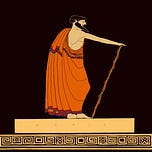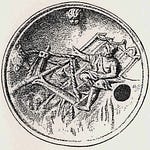Odyssey 6.1-109
These lines are about girls bathing and playing naked in the woods. Everything seems meant to arouse. They throw off their veils and play with a ball: taking off her veil is the job for a husband on his wedding night. (It is sometimes a metaphor for the bedroom action that comes after; to ‘loosen the veil’ can also connote rape, however, and in this latter sense is applied to the sacking of a city. We have even heard it used to describe the opening of vintage wine [3.392].) Off they go a-washing in the woods, without a care in the world.
We do come to realise that there aren’t strangers around in Phaeacia to worry about. The city was founded where no men come, to get away from the Cyclopes, their original brutish neighbours. (Everything ‘original’ in the human world of the Iliad and the Odyssey seems only to be two or three generations old.) The city has been walled, like a later, classical Greek polis, though there do not seem to be enemies to threaten her. That makes it an oddly insular move. They’ve been bullied. But outside the walls, what about the wild beasts in their lairs, whom Odysseus was so worried about? As I think we’ve been disclosing in various ways, Homer prefers such questions to hang in the atmosphere, to juice it up, if you will. The detail about unhitching the mules to be set free to feed by the river, is pure scene-painting, but it is of a piece with all the loosening of restrictions on domestic animals and women in this environment free of men and men’s rule. And the most human moment, to my mind, is when the women start competing in the natural washing tubs. They are absorbed in themselves and their activity. Men turn tasks into contests almost by instinct. Left to themselves, Homer seems to say, so do women. Freedom and gamesmanship come to them amidst the necessary drudgery, even when it comes to the glittery ones, of washing clothes.
Nausicaa is a tall girl, evidently, rhythmic and athletic, who takes the lead in the song and dance with a ball; this movement must be something like the rhythmic gymnastics at the modern Olympics. Her very name, which is four syllables in Greek, has a stately dactylic rhythm; the late metricians call this shape a choriamb, —∪∪—, NAU-sik-ah-AH. She is a girl who expresses herself in her rhythm. This calls forth an unusually uncomplicated simile from Homer:
Such an Artemis she goes! Down the mountains, Arrow-Shedder,
Whether it’s Taygetus’ extended slopes, or down Erymanthus,
Delighting in the wild boar and the speeding deer:
And with her play the Nymphs, Aegis-Holder Zeus’s girls
From the countryside; and she rejoices in her mind’s vessel, Mother Leto—
Above all the other girls she holds her head and forehead,
And easily is her daughter known, though all of them are beautiful;
Just so was she conspicuous among her attendants, this unbroken virgin.
The last words translate παρθένος ἀδμής. We last encountered this word admēs ‘unbroken’ in describing the heifer, who was sacrificed by the sons at Nestor’s house in honour of female Athena, to the ululation of Nestor’s elder wife and the rest of the household’s women. Nestor asks for a cow who was “A virgin [ἀδμήτην]: who never yet was brought under the yoke by a man.” [3.383] This is the fate that most contrasts the subjects in the simile: the forever free and roaming Artemis, the joy in her mother Leto’s eye at her transcendence, filling seven lines in the vehicle, and the single anonymous line in the tenor for the human daughter. Each is an unbroken virgin, parthenon admēs, but Nausicaa cannot remain so. Dislocation, impregnation, nostalgia and the pain of loss are to come to her, while the gods live in eternal bliss and being. Even now there is a wild beast lurking in his lair nearby, an epic peeping Tom sleeping naked, waiting for his cue.
[Most of what follows is taken from a lecture I gave at St. John’s College in Annapolis, in 2003.]
‘Athena enters Nausicaa’s bedroom like a breath of wind. The doors are shut, and sleeping by the doorposts are her handmaidens like the Graces. Nausicaa herself is said to be just like the female immortals. The whole tableau is a temple entrance, where the statuary doorposts have fallen asleep, and sleeping also is the goddess in the inner sanctum. Freud must have appreciated this setup for the entrance of the dream wish, although I am not aware of his having written about it.
‘The wind’s breath assumes the identity of Nausicaa’s girlfriend and stands over her head, suggesting to the suggestible one that the day of her wedding is near, and that she had better get her laundry done. Athena the ever-virgin sets into motion a longing in the young girl, who is not after all a goddess but only a virgin, for something she cannot understand in any experiential sense, a chain of becoming that apparently excites her, but that must lead to a subjection of individuality and freedom in body and soul to a husband and to pregnancy. For Athena, Nausicaa is a means of Odysseus’ conveyance home. For Nausicaa, it is hard to say—she is a veiled thing—but if it is not a day that dawns for heartbreak, it is perhaps a day that gets her to a nunnery.’
There is a cruelty, woman to woman, in the way Athena sets the girl up for meeting Odysseus. Athena is a virgin also in the sense that she has never been human. She reminds her that the day of her womanhood is going to be one of these coming, and reminds her of her bourgeois, insular Phaeacian suitors clamouring for a go. But her mind and spirit are awakened to the possibility of a man; and the man she is suddenly going to be presented with is the naked Odysseus. Here is an exotic and mysterious and ‘manly’ foreigner, forever to change and to cheat her expectations of the possible.
‘As for Athena, her job done, a seed of turbulence planted in the world of becoming within the heart of a girl, off she goes …
Οὔλυμπόνδ’, ὅθι φασὶ θεῶν ἕδος ἀσφαλὲς αἰεί
ἔμμεναι · οὔτ’ ἀνέμοισι τινάσσεται οὔτε ποτ’ ὄμβρωι
δεύεται οὔτε χιὼν ἐπιπίλναται, ἀλλὰ μάλ’ αἴθρη
πέπταται ἀνέφελος, λευκὴ δ’ ἐπιδέδρομεν αἴγλη · 45
τῶι ἔνι τέρπονται μάκαρες θεοὶ ἤματα πάντα.
ἔνθ’ ἀπέβη Γλαυκῶπις, ἐπεὶ διεπέφραδε κούρηι.
Toward Olympus, where they say the seat of the gods, untippable always,
Has its being. Neither in the winds does it tremble, nor ever by the rainstorm
Is it moistened, nor does the snow come near it; rather, a prodigious aether
Is spread out cloudless, and a whiteness all over it, a sheen;
In this they delight, the blessed gods, through all the days.
Up she went, Owl-Eyes, once she instructed the pubescent girl.
‘Note the enjambment of ἔμμεναι in the second line. It is not always a thing to note in Homer when the infinitive of ‘being’ is enjambed; but in the context of this passage, with Homer’s longest way of expressing such an infinitive, the conclusion seems inescapable, that he means to describe the radiant weatherless Olympus as a realm of being. Athena has agitated the heart of a girl, having descended like a wind into the world of becoming, and then disappeared carefree, concrete as ever, and pure as ever, into the place of forever and all days. Where philosophers talk about the riddle of being and becoming, Homer renders it.’
The old philosophers, men after Homer but before Socrates, used to pontificate and fuss about being and motion. πάντα ρεῖ said Heraclitus, ‘everything flows’ or ‘all is flux’. There were a number of these pioneers who struggled to understand how there could be certain knowledge of anything—paradoxically, like that contained in the phrase panta rei—when the whole universe seemed to be constantly in mid-flow. In their face Parmenides asserts ἕν τὸ πάν: in fact ‘the all is one’, or ἕν τὸ ὄν, ‘being is one’. Was Homer, a pre-pre-Socratic, also a proto-philosopher? Does the world of the gods stand for the eternal beings and knowable truths, while the world of men and women is the world of coming-to-be and passing away? Artemis, for one, would muddy such generalities. Where would she be without her earthly hunts, her arrows, her wild boar and mountain deer? Even Olympians need to get away, it seems. But Athena’s return to the sheen of Olympus, weather-free for all time, after causing arousal and unnameable stirrings in Nausicaa below, could hardly be more illustrative not only of the separation of being from becoming, but of the intrusion or penetration of the one into the other.
‘There are some among us—and what is a community of Greeks, without a Phoenician Philistine to teach it the alphabet—who can be expected to say that Homer has merely ‘dressed up,’ or ‘sensualised,’ a truth which philosophy understands without the beautiful and seductive trappings. Such people do not know rhythm, and hence they do not know philosophy; because to know rhythm is to know the riddle—by direct encounter—not the answer to it, but the enigma itself—of being and becoming.
‘Rhythm is being moving through becoming; it is the one moving through the many; it is the singular distended through the plural. ἔμμεναι enjambed is a vortex hedged against the pressure of the stream, a stream which would prefer to keep within the banks of the line. Words enjambed in the stream of rhythm are not sugared and sweetened; they are placed and focused, so that their meaning becomes squeezed and clarion. ἔμμεναι enjambed is ‘being’ rendered.
‘In light of such a passage, it is tempting to see the development of philosophy as a kind of abstractive regression in men who were raised on the rhythm of Homer. Whoever he or she was, Homer alone had the imaginative insight to see the problem of being and becoming distilled in the dream of a pubescent girl.’
In Greek:













Being and Becoming Nausicaa: Homer in English